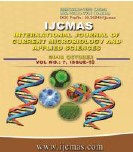


 National Academy of Agricultural Sciences (NAAS)
National Academy of Agricultural Sciences (NAAS)

|
PRINT ISSN : 2319-7692
Online ISSN : 2319-7706 Issues : 12 per year Publisher : Excellent Publishers Email : editorijcmas@gmail.com / submit@ijcmas.com Editor-in-chief: Dr.M.Prakash Index Copernicus ICV 2018: 95.39 NAAS RATING 2020: 5.38 |
KBSH-44, a public sector sunflower hybrid has high biomass production capacity with yield comparable to other popular hybrids. This hybrid is tall with more stalk weight wherein, photo-assimilates are locked up in vegetative parts with a reduced translocation to their productive structures (seed). Any approach, which reduces the plant height, may improve the translocation efficiency to the seed and thus seed yield. In this context, a field experiment was conducted to reduce the plant height by foliar application of plant growth retardants viz., paclobutrazol (PBZ), mepiquat chloride (MPC) and chloromequat chloride (CCC) to improve the sink strength. Application of growth retardants at 39 days after sowing reduced the plant height immediately after the application. However, the plant height recovered by the time of crop maturity. Application of mepiquat chloride twice (39and 52 days after sowing) resulted in increased seed yield (49.8 g plant-1) over the control (35.2 g plant-1) and even over the cycocel or paclobutrazol treatment. The increased seed yield (41.5 %) with mepiquat chloride was due to increased sink strength parameters such as increased seed number (820 seeds per thalamus), test weight (6.01 g 100 seeds) and HI (0.35) over unsprayed control plants.
 |
 |
 |
 |
 |